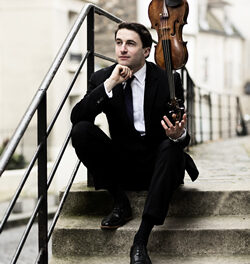The annual Christmas concert of the Choral Society of Durham, held in Duke Chapel, is an event keenly anticipated each year around this time. This year the program began with collaborative artists, the Durham Children’s Choir, conducted by Dena Byers. They were beautiful in their red skirts and red trousers and black shirts. The children opened with “Angels o’er the field were singing,” a traditional French carol especially adapted for children’s choir by American composer, Vicki Tucker Courtney. It was lovely and set just the right celebratory mood for the evening.
The next selection was a 14th century German carol, arranged by Courtney. “In dulci jubilo” (Latin for “in sweet jubilation”) was impressive, and the 65-voice choir handled the Latin in this piece as well as sang together and was perfectly in tune. It was a special moment to remind us of all the beauty in the world and in this season of joy.
“The First Noel” is a familiar carol – probably in every church’s hymnbook – but in the arrangement by Dan Forrest was something special with glorious counterpoint and a soaring descant.
The Durham Children’s Choir closed this first section of the program with a beautiful setting of Charles Anthony Silvestri’s poem “Seasons,” by the Norwegian-American composer Ola Gjeilo. A tribute to all four seasons in four quatrains, it was set in warm gentle harmonies and sung in balanced precision.
The Choral Society of Durham, under the guidance of the renowned choral conductor Rodney Wynkoop, sang six gorgeous carols beginning with “Nativity Carol” by William Mathias. Now this is the sound: a full-voiced chorus of 126 blended in the reverberant cathedral setting with rich organ stops deployed by Choral Society accompanist, David Cole. It made my heart leap up with hope and possibility, especially the great antiphonal passages.
“My Lord Has Come,” with words and music by the contemporary English composer Will Todd, arose out of a sustained ground and soared gloriously to fill nave, narthex and choir.
The first two verses of the “Sussex Carol” (“On Christmas Night All Christians Sing”) were sung in a traditional arrangement by David Willcocks, and the last two verses in a lively off-beat, syncopated version by Bob Chilcott. The jaunty piano accompaniment was performed by Cole.
“What Child is This?” the much loved carol set to the English tune of “Greensleeves” by Alice Parker and Robert Shaw was sung unaccompanied by the choir and provided an awesome silvery sound.
Sometimes, the simplest and least pretentious of music provides the grandest experience. Such was the case with “Away in a Manger” by Johnathan E. Spilman and arranged by Paul Sjolund. This lovely cradle song was given a crystalline charm by Sjolund with open chords and arpeggio accompaniment performed by Cole. The chorus sang with touching gentleness.
Scott Hill joined Cole at the piano, and between the two of them, they tickled all 88 keys (I do believe!) with technical adroitness and musical skill. Their combination with the chorus provided a delightful and pleasing conclusion to the first half of the concert.
The second half of this year’s Christmas concert featured Benjamin Britten’s delightful cantata which could almost be a chancel opera – Saint Nicolas. Britten was one of the supreme musical craftsmen of the 20th century. His mastery in writing for the human voice in solo, ensemble and choral settings is reflected in a number of masterpieces, among them operas, sacred music, incidental pieces, art songs, and others.
Saint Nicolas is based on the life of the 4th century Bishop of Myra who is also loosely connected to the Santa Claus mythology of today. The story of Nicolas’ life is full of outrageous legends that tell of miraculous deeds. Let it be said that the true Saint Nicolas devoted his life to serving God, becoming an advocate for children, the poor, and sailors at sea. Most of the rest we will take with a grain of salt. Neither Britten nor his librettist Eric Crozier made any attempt to separate fact from legend and simply presented the story as it has come down to them and us.
The cantata is cast in nine movements from the birth to the death of the saint with two liturgically placed selections to be sung by all, including the audience. The role of Nicolas was sung by Daniel Shirley, who was heard in the 2014 Christmas concert performance of CPE Bach’s Magnificat. His dramatic portrayal was powerful and moving.
The Durham Children’s choir as the gallery choir in the cantata did an outstanding job. Much of the music was a challenge for them and they were well prepared.
Kyle Jewell was Nicolas as a boy in the delightful chorus “The Birth of Nicolas.” Evan Byers, John Cross and Henry Mitchell were the three “pickled boys” singing a raptured Alleluia as Nicolas brought them back to life.
The Choral Society of Durham’s singing with precise ensemble and winsome dramatic interpretation was supported by a professionally polished instrumental ensemble led by Eric Pritchard and with Jane Lynch at the organ, all together providing this delight of the holiday season. It is the closest thing to real magic.











